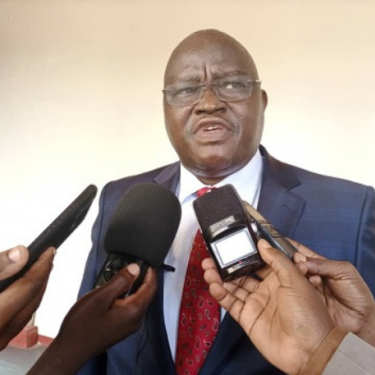CAR government proposes criminalising press offences again

Deploring an alarming decline in press freedom in the Central African Republic, Reporters Without Borders (RSF) calls on the government to abandon a bill that would make press offences punishable by imprisonment, and to do what is necessary to protect journalists, who are being subjected to a wave of arrests, physical attacks and threats.
At a meeting on 17 October with his staff to which journalists were invited, justice minister Arnaud Djoubaye Abazene unveiled a proposed revision of the December 2020 law on freedom of communication, which decriminalised press offences. If his bill is adopted, journalists could again be jailed in connection with their work and the media regulator, the High Council for Communication (HCC), would be placed under the communication ministry’s control.
“Instead of protecting journalists against attacks, threats and arbitrary arrest, the authorities are taking steps to crack down harder on the media,” said Sadibou Marong, the head of RSF’s sub-Saharan desk. “If this law passes, it will give the authorities a free hand to reinforce censorship and control information. In a country where violence is still rampant in several regions, the authorities should promote the media so that they can play their role fully, not restore prison sentences for press offences. We urge them to abandon this bill and to do everything possible to protect journalists.”
RSF has been told that the proposed revision of the press law is currently being examined by the government general secretariat, and will have to be approved by the cabinet before being submitted to parliament.
The changes are being proposed against a backdrop of increased arrests, attacks and threats against journalists during the past two months.
Journalists harassed
The victims include the editor of the newspaper Le Charpentier, Christian Azoudaoua, who was arrested arbitrarily on 6 September on the orders of the national assembly’s deputy speaker after Azoudaoua named him in an article about an alleged case of embezzlement within the national assembly. Azoudaoua was finally released at the end of September.
After an article about a senior army officer and articles criticising the government’s proposed changes to the constitution, recently rejected by the constitutional court, Quotidien de Bangui journalist Landry Ulrich Nguéma Ngokpélé was forced to leave his home and go into hiding 40 km outside the capital because of the threat of reprisals. “The authorities have become very virulent towards critical media,” he told RSF.
Fiacre Salabé, a freelance journalist who often criticises the government in his articles, has been threatened and attacked, especially after he criticised the proposed amendments to the constitution and the government’s plan to put the HCC under the communication ministry’s control.
“Ever since then, I’ve been receiving anonymous phone calls and death threats and I’m being directly attacked on social media,” he said. He was physically attacked on 4 September by demonstrators while covering a rally organised by a pro-government group, and again on 8 October by two youths who recognised him in the street.
Ndjoni Sango news site director Éric Ngaba, who began writing and publishing a series of articles about a government opponent in June, has been receiving repeated threats since September in the forms of SMS messages, videos on Facebook and cartoons portraying him in in a threatening manner on social media.
Intimidation of independent media
Arrests and violence are not the only methods used to intimidate independent media, as recently confirmed by Ndeke Luka, a leading radio station that uses some editorial independence in its coverage of national news. After it broadcast several investigative reports exposing governance shortcomings, the communication minister told Ndeke Luka that the government was going to review its partnership with the station and the amount of taxes it has to pay
The CAR is ranked 101st out of 180 countries in RSF's 2022 World Press Freedom Index.
